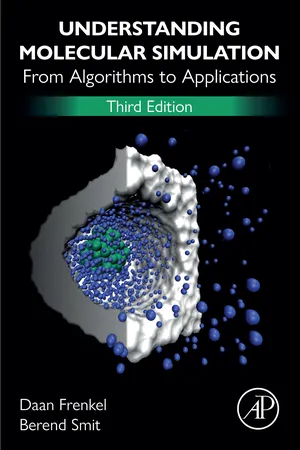
eBook - ePub
Understanding Molecular Simulation
From Algorithms to Applications
- 679 pages
- English
- ePUB (mobile friendly)
- Available on iOS & Android
eBook - ePub
About this book
Understanding Molecular Simulation explains molecular simulation from a chemical-physics and statistical-mechanics perspective. It highlights how physical concepts are used to develop better algorithms and expand the range of applicability of simulations. Understanding Molecular Simulation is equally relevant for those who develop new code and those who use existing packages. Both groups are continuously confronted with the question of which computational technique best suits a given application. Understanding Molecular Simulation provides readers with the foundational knowledge they need to learn about, select and apply the most appropriate of these tools to their own work. The implementation of simulation methods is illustrated in pseudocodes, and their practical use is shown via case studies presented throughout the text.
Since the second edition's publication, the simulation world has expanded significantly: existing techniques have continued to develop, and new ones have emerged, opening up novel application areas. This new edition aims to describe these new developments without becoming exhaustive; examples are included that highlight current uses, and several new examples have been added to illustrate recent applications. Examples, case studies, questions, and downloadable algorithms are also included to support learning. No prior knowledge of computer simulation is assumed.
- Fully updated guide to both the current state and latest developments in the field of molecular simulation, including added and expanded information on such topics as molecular dynamics and statistical assessment of simulation results
- Gives a rounded overview by showing fundamental background information in practice via new examples in a range of key fields
- Provides online access to new data, algorithms and tutorial slides to support and encourage practice and learning
Tools to learn more effectively

Saving Books

Keyword Search

Annotating Text

Listen to it instead
Information
Table of contents
- Understanding Molecular Simulation
- Chapter 1 Introduction
- Chapter 2 Thermodynamics and statistical mechanics
- Chapter 3 Monte Carlo simulations
- Chapter 4 Molecular Dynamics simulations
- Chapter 5 Computer experiments
- Chapter 6 Monte Carlo simulations in various ensembles
- Chapter 7 Molecular Dynamics in various ensembles
- Chapter 8 Free-energy calculations
- Chapter 9 Free energies of solids
- Chapter 10 Free energy of chain molecules
- Chapter 11 Long-ranged interactions
- Chapter 12 Configurational-bias Monte Carlo
- Chapter 13 Accelerating Monte Carlo sampling
- Chapter 14 Time-scale-separation problems in MD
- Chapter 15 Rare events
- Chapter 16 Mesoscopic fluid models
- Appendix A Lagrangian and Hamiltonian equations of motion
- Appendix B Non-Hamiltonian dynamics
- Appendix C Kirkwood-Buff relations
- Appendix D Non-equilibrium thermodynamics
- Appendix E Non-equilibrium work and detailed balance
- Appendix F Linear response: examples
- Appendix G Committor for 1d diffusive barrier crossing
- Appendix H Smoothed dissipative particle dynamics
- Appendix I Saving CPU time
- Appendix J Some general purpose algorithms
- Appendix K Errata
- Appendix L Miscellaneous methods
- Appendix M Miscellaneous examples
- Appendix N Supporting information for case studies
- Appendix O Small research projects
- Appendix P Hints for programming
- Bibliography
- Index
- Author index
Frequently asked questions
Yes, you can cancel anytime from the Subscription tab in your account settings on the Perlego website. Your subscription will stay active until the end of your current billing period. Learn how to cancel your subscription
No, books cannot be downloaded as external files, such as PDFs, for use outside of Perlego. However, you can download books within the Perlego app for offline reading on mobile or tablet. Learn how to download books offline
Perlego offers two plans: Essential and Complete
- Essential is ideal for learners and professionals who enjoy exploring a wide range of subjects. Access the Essential Library with 800,000+ trusted titles and best-sellers across business, personal growth, and the humanities. Includes unlimited reading time and Standard Read Aloud voice.
- Complete: Perfect for advanced learners and researchers needing full, unrestricted access. Unlock 1.4M+ books across hundreds of subjects, including academic and specialized titles. The Complete Plan also includes advanced features like Premium Read Aloud and Research Assistant.
We are an online textbook subscription service, where you can get access to an entire online library for less than the price of a single book per month. With over 1 million books across 990+ topics, we’ve got you covered! Learn about our mission
Look out for the read-aloud symbol on your next book to see if you can listen to it. The read-aloud tool reads text aloud for you, highlighting the text as it is being read. You can pause it, speed it up and slow it down. Learn more about Read Aloud
Yes! You can use the Perlego app on both iOS and Android devices to read anytime, anywhere — even offline. Perfect for commutes or when you’re on the go.
Please note we cannot support devices running on iOS 13 and Android 7 or earlier. Learn more about using the app
Please note we cannot support devices running on iOS 13 and Android 7 or earlier. Learn more about using the app
Yes, you can access Understanding Molecular Simulation by Daan Frenkel,Berend Smit in PDF and/or ePUB format, as well as other popular books in Physical Sciences & Chemistry. We have over one million books available in our catalogue for you to explore.